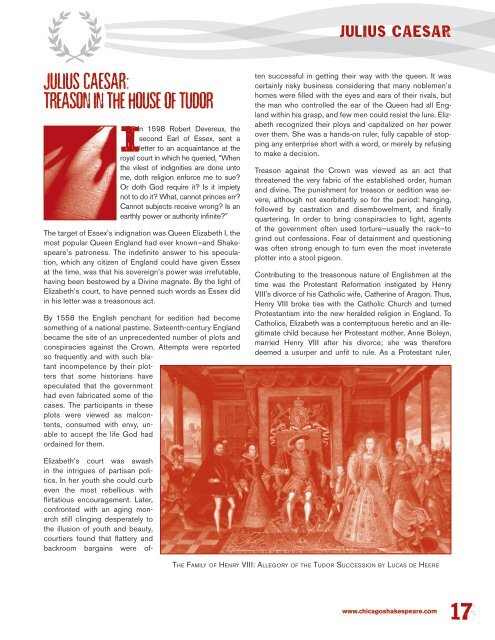Julius Caesar • 2013 - Chicago Shakespeare Theater
Julius Caesar • 2013 - Chicago Shakespeare Theater
Julius Caesar • 2013 - Chicago Shakespeare Theater
Create successful ePaper yourself
Turn your PDF publications into a flip-book with our unique Google optimized e-Paper software.
JULIUS CAESAR:<br />
TREASON IN THE HOUSE OF TUDOR<br />
In 1598 Robert Devereux, the<br />
second Earl of Essex, sent a<br />
letter to an acquaintance at the<br />
royal court in which he queried, “When<br />
the vilest of indignities are done unto<br />
me, doth religion enforce me to sue?<br />
Or doth God require it? Is it impiety<br />
not to do it? What, cannot princes err?<br />
Cannot subjects receive wrong? Is an<br />
earthly power or authority infinite?”<br />
The target of Essex’s indignation was Queen Elizabeth I, the<br />
most popular Queen England had ever known—and <strong>Shakespeare</strong>’s<br />
patroness. The indefinite answer to his speculation,<br />
which any citizen of England could have given Essex<br />
at the time, was that his sovereign’s power was irrefutable,<br />
having been bestowed by a Divine magnate. By the light of<br />
Elizabeth’s court, to have penned such words as Essex did<br />
in his letter was a treasonous act.<br />
By 1558 the English penchant for sedition had become<br />
something of a national pastime. Sixteenth-century England<br />
became the site of an unprecedented number of plots and<br />
conspiracies against the Crown. Attempts were reported<br />
so frequently and with such blatant<br />
incompetence by their plotters<br />
that some historians have<br />
speculated that the government<br />
had even fabricated some of the<br />
cases. The participants in these<br />
plots were viewed as malcontents,<br />
consumed with envy, unable<br />
to accept the life God had<br />
ordained for them.<br />
Elizabeth’s court was awash<br />
in the intrigues of partisan politics.<br />
In her youth she could curb<br />
even the most rebellious with<br />
flirtatious encouragement. Later,<br />
confronted with an aging monarch<br />
still clinging desperately to<br />
the illusion of youth and beauty,<br />
courtiers found that flattery and<br />
backroom bargains were of-<br />
JULIUS CAESAR<br />
ten successful in getting their way with the queen. It was<br />
certainly risky business considering that many noblemen’s<br />
homes were filled with the eyes and ears of their rivals, but<br />
the man who controlled the ear of the Queen had all England<br />
within his grasp, and few men could resist the lure. Elizabeth<br />
recognized their ploys and capitalized on her power<br />
over them. She was a hands-on ruler, fully capable of stopping<br />
any enterprise short with a word, or merely by refusing<br />
to make a decision.<br />
Treason against the Crown was viewed as an act that<br />
threatened the very fabric of the established order, human<br />
and divine. The punishment for treason or sedition was severe,<br />
although not exorbitantly so for the period: hanging,<br />
followed by castration and disembowelment, and finally<br />
quartering. In order to bring conspiracies to light, agents<br />
of the government often used torture—usually the rack—to<br />
grind out confessions. Fear of detainment and questioning<br />
was often strong enough to turn even the most inveterate<br />
plotter into a stool pigeon.<br />
Contributing to the treasonous nature of Englishmen at the<br />
time was the Protestant Reformation instigated by Henry<br />
VIII’s divorce of his Catholic wife, Catherine of Aragon. Thus,<br />
Henry VIII broke ties with the Catholic Church and turned<br />
Protestantism into the new heralded religion in England. To<br />
Catholics, Elizabeth was a contemptuous heretic and an illegitimate<br />
child because her Protestant mother, Anne Boleyn,<br />
married Henry VIII after his divorce; she was therefore<br />
deemed a usurper and unfit to rule. As a Protestant ruler,<br />
The Family oF henry viii: alleGory oF The TuDor suCCession By luCas De heere<br />
www chicagoshakespeare com<br />
17




